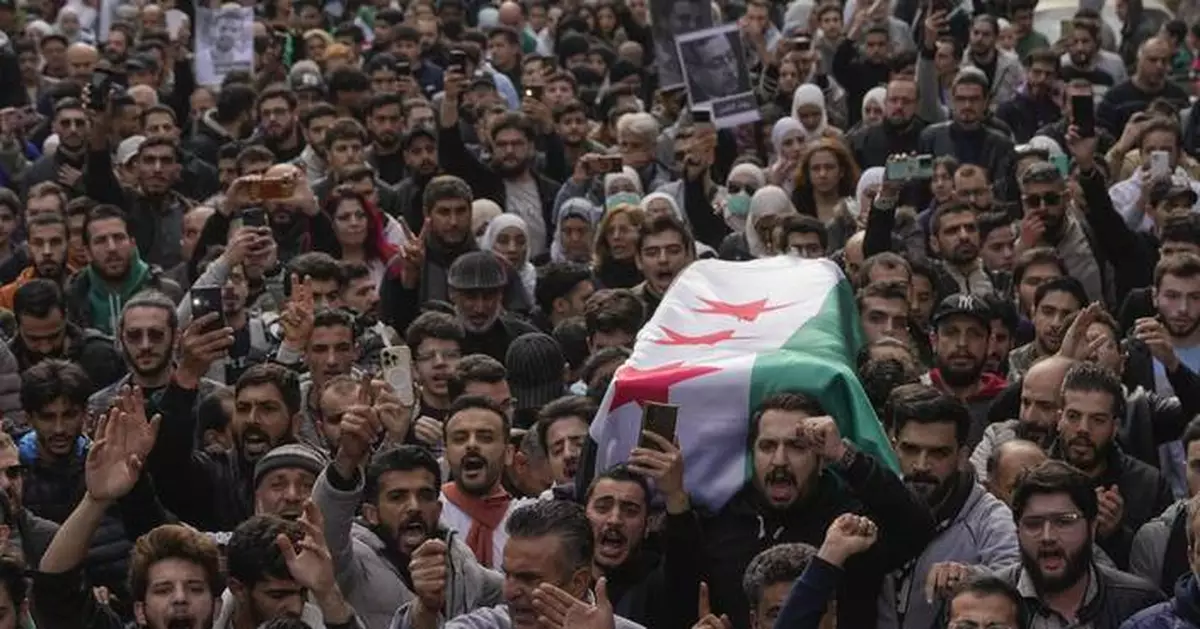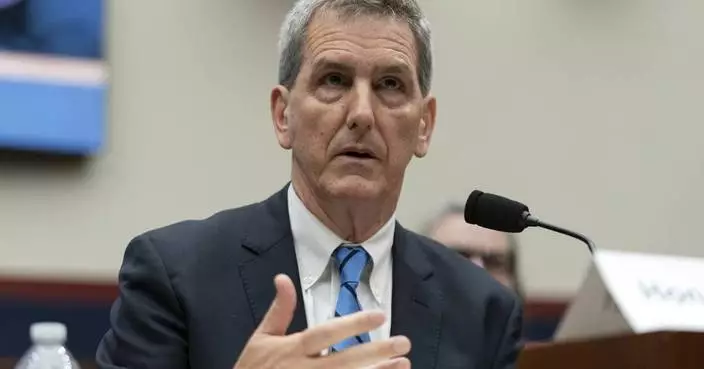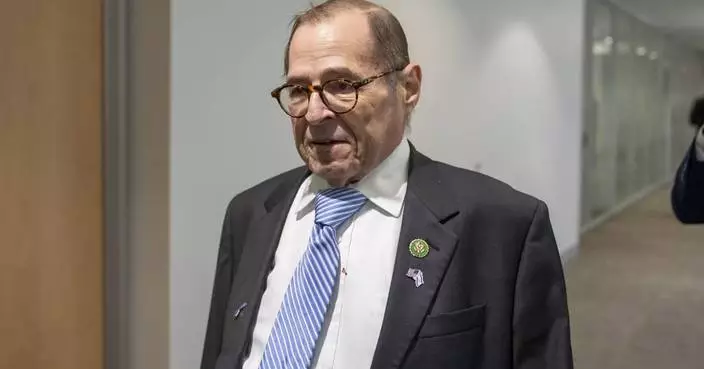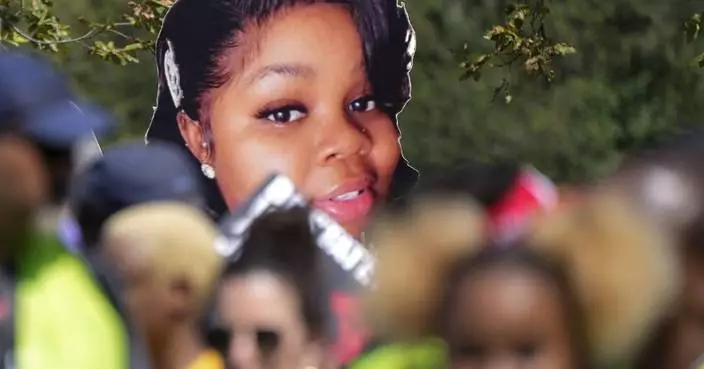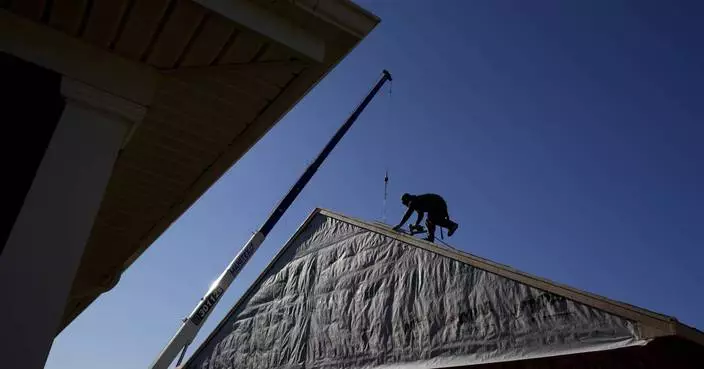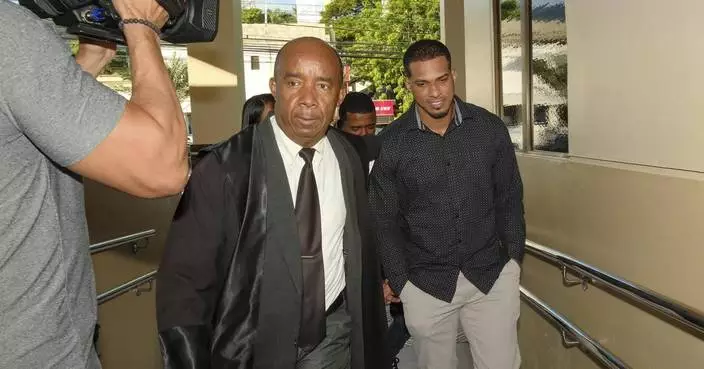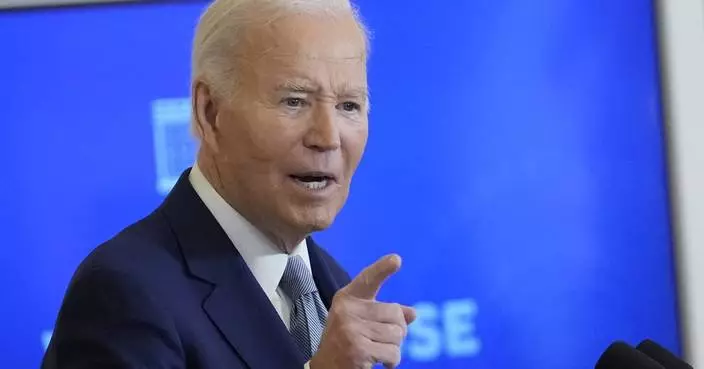DAMASCUS, Syria (AP) — Hundreds of Syrians marched through central Damascus in a funeral procession Thursday to honor one of the country's most prominent anti-government activists, whose body was found after the ouster of President Bashar Assad.
The procession for Mazen al-Hamada — unimaginable only a week earlier — turned the moment of mourning into a call for justice, with marchers carrying posters of other missing detainees and chanting for Assad to be put on trial.
Click to Gallery
A morgue worker uncovers the body of Syrian activist Mazen al-Hamada before preparing it for burial in Damascus, Thursday, Dec. 12, 2024. Al-Hamad's corpse was found wrapped in a bloody sheet in Saydnaya prison. He had fled to Europe but returned to Syria in 2020 and was imprisoned upon arrival. (AP Photo/Ghaith Alsayed)
A man shouts during the funeral of Syrian activist Mazen al-Hamada in Damascus Thursday Dec. 12, 2024. Al-Hamad's mangled corpse was found wrapped in a bloody sheet in Saydnaya prison. He had fled to Europe but returned to Syria in 2020 and was imprisoned upon arrival. (AP Photo/Hussein Malla)
A woman cries during the funeral of Syrian activist Mazen al-Hamada in Damascus Thursday Dec. 12, 2024. Al-Hamad's mangled corpse was found wrapped in a bloody sheet in Saydnaya prison. He had fled to Europe but returned to Syria in 2020 and was imprisoned upon arrival. (AP Photo/Hussein Malla)
Mourners, including his sister Amal, left, attend the funeral of Syrian activist Mazen al-Hamada in Damascus Thursday Dec. 12, 2024. Al-Hamad's mangled corpse was found wrapped in a bloody sheet in Saydnaya prison. He had fled to Europe but returned to Syria in 2020 and was imprisoned upon arrival. (AP Photo/Hussein Malla)
The coffin of Syrian activist Mazen al-Hamada is carried for burial in Damascus Thursday Dec. 12, 2024. Al-Hamad's mangled corpse was found wrapped in a bloody sheet in Saydnaya prison. He had fled to Europe but returned to Syria in 2020 and was imprisoned upon arrival. (AP Photo/Hussein Malla)
The coffin of Syrian activist Mazen al-Hamada is carried for burial in Damascus Thursday Dec. 12, 2024. Al-Hamad's mangled corpse was found wrapped in a bloody sheet in Saydnaya prison. He had fled to Europe but returned to Syria in 2020 and was imprisoned upon arrival. (AP Photo/Ghaith Alsayed)
Mourners hold up portraits of missing opposition activists during the funeral of Syrian activist Mazen al-Hamada iin Damascus Thursday Dec. 12, 2024. Al-Hamad's mangled corpse was found wrapped in a bloody sheet in Saydnaya prison. He had fled to Europe but returned to Syria in 2020 and was imprisoned upon arrival. (AP Photo/Ghaith Alsayed)
A woman weeps during the funeral of Syrian activist Mazen al-Hamada in Damascus, Thursday, Dec. 12, 2024. Al-Hamad's mangled corpse was found wrapped in a bloody sheet in Saydnaya prison. He had fled to Europe but returned to Syria in 2020 and was imprisoned upon arrival. (AP Photo/Hussein Malla)
The coffin of Syrian activist Mazen al-Hamada is carried for burial in Damascus Thursday Dec. 12, 2024. Al-Hamad's mangled corpse was found wrapped in a bloody sheet in Saydnaya prison. He had fled to Europe but returned to Syria in 2020 and was imprisoned upon arrival. (AP Photo/Hussein Malla)
The capture of Damascus by insurgents last weekend brought thousands of people into the streets in celebrations, and Thursday’s march recalled the funerals-turned-protests of the early days of the uprising against Assad 13 years ago.
“We will not forget your blood, Mazen,” the marchers, most of them young people, chanted outside a mosque while family and friends held funeral prayers inside.
Others chanted: “We will get our revenge, Bashar. We will bring you before the law.”
Al-Hamada joined the anti-government protest movement in its early days and was arrested several times. Released after a long detention in 2013, he left Syria for the Netherlands. There, he became a well-known figure and symbol of the anti-Assad movement, speaking publicly about the torture he endured in prison.
Still, he returned to Syria in 2020 — apparently lured by promises of safety — and immediately disappeared.
His family found him Tuesday in a hospital morgue. By the condition of his body, al-Hamada, who was in his late 40s, appeared to have been killed only in the past week, his family said.
Tens of thousands of Syrians are still seeking information about the fate of loved ones who disappeared under Assad's police state. Many have swarmed prisons and detention facilities in their searches. Dozens of bodies have been found in morgues, some emaciated, and others with wounds that suggest they were tortured.
The rebels and the transitional government have called for any information that would help identify secret prisons.
In Thursday’s procession, supporters, protesters and family members carried al-Hamada’s body from al-Mujtahid mosque toward a mosque in central Damascus’s al-Hijaz Square. At Abu Awf Mosque, several family members of those still missing joined.
Many participants said they last protested in Damascus 13 years ago, before Assad’s brutal crackdown on protesters turned the conflict into full-blown civil war.
Mohammad Kulthum, 32, marched in the procession with his mother.
“I could not have imagined going out in a rally in any way, shape or form in Damascus.”
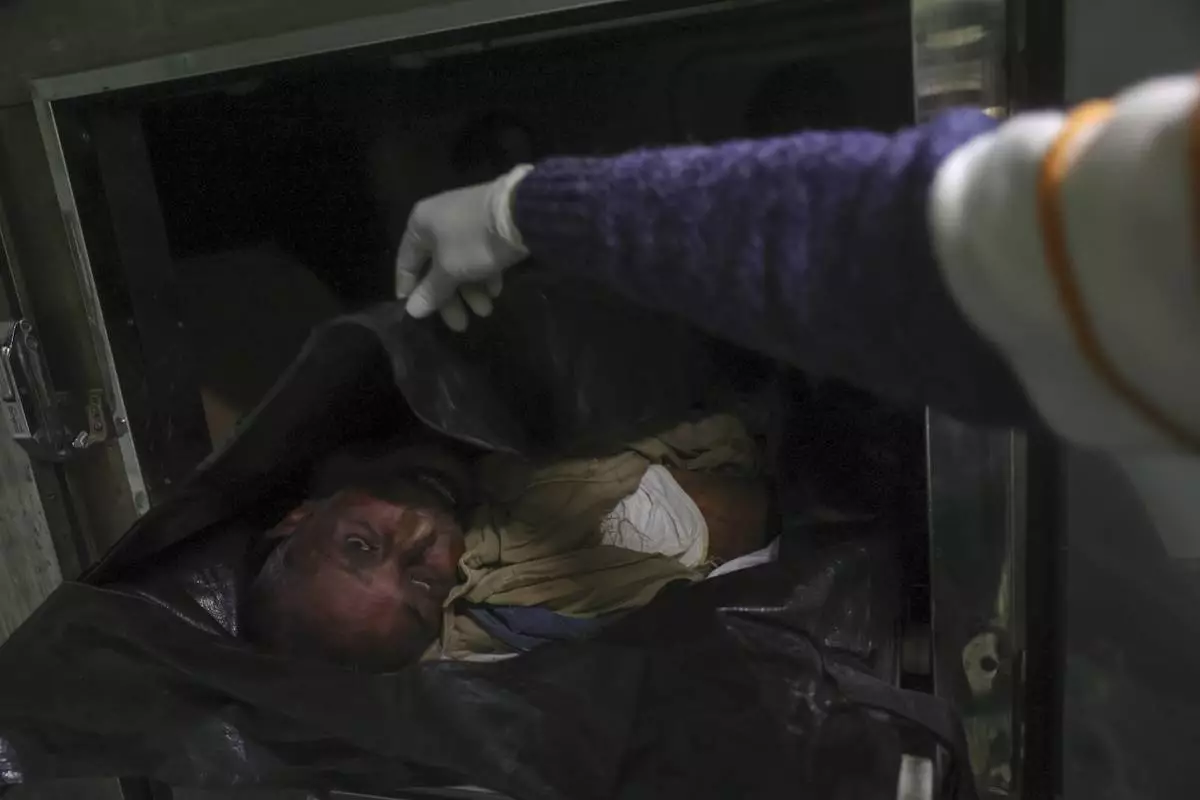
A morgue worker uncovers the body of Syrian activist Mazen al-Hamada before preparing it for burial in Damascus, Thursday, Dec. 12, 2024. Al-Hamad's corpse was found wrapped in a bloody sheet in Saydnaya prison. He had fled to Europe but returned to Syria in 2020 and was imprisoned upon arrival. (AP Photo/Ghaith Alsayed)
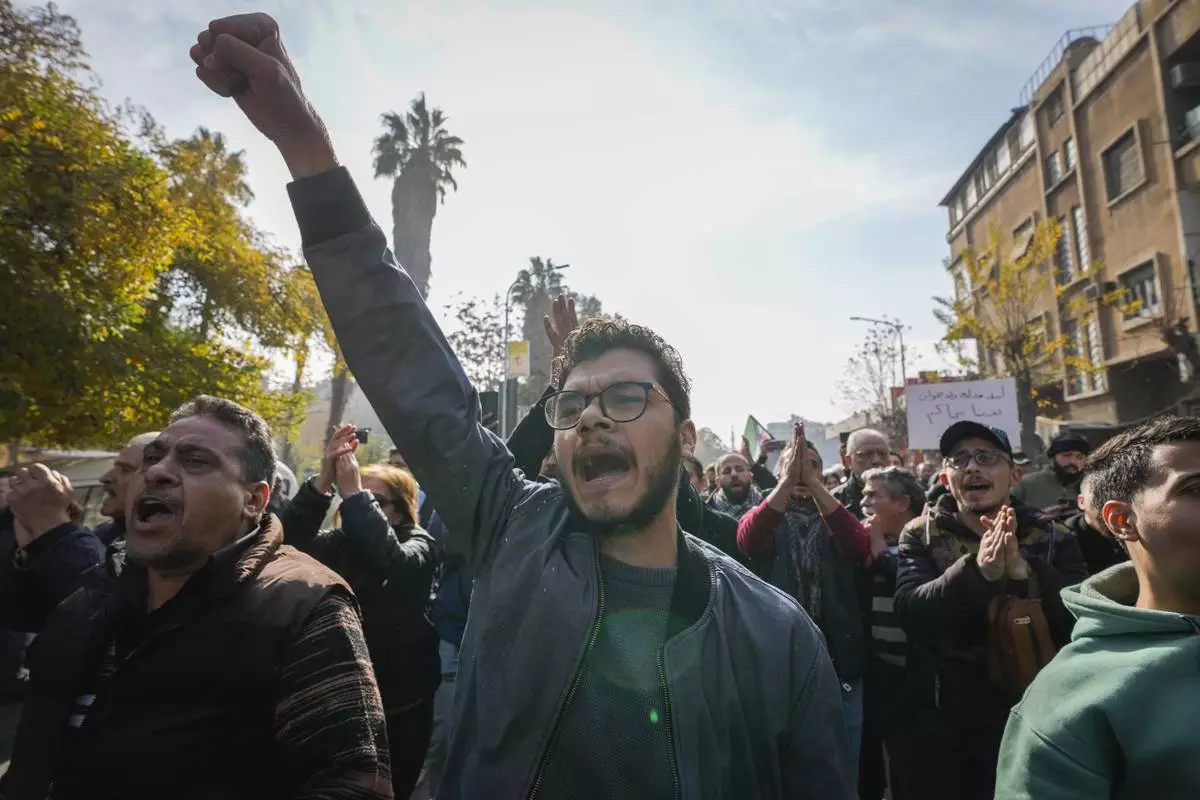
A man shouts during the funeral of Syrian activist Mazen al-Hamada in Damascus Thursday Dec. 12, 2024. Al-Hamad's mangled corpse was found wrapped in a bloody sheet in Saydnaya prison. He had fled to Europe but returned to Syria in 2020 and was imprisoned upon arrival. (AP Photo/Hussein Malla)
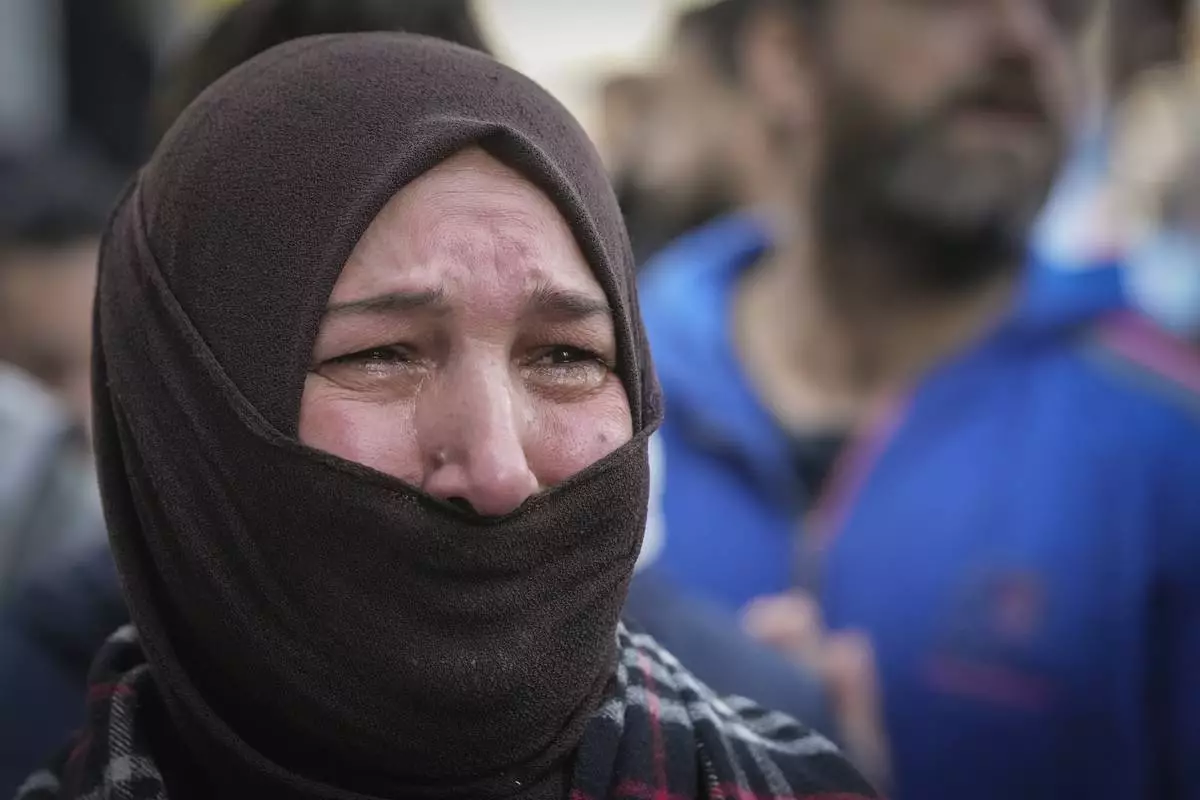
A woman cries during the funeral of Syrian activist Mazen al-Hamada in Damascus Thursday Dec. 12, 2024. Al-Hamad's mangled corpse was found wrapped in a bloody sheet in Saydnaya prison. He had fled to Europe but returned to Syria in 2020 and was imprisoned upon arrival. (AP Photo/Hussein Malla)
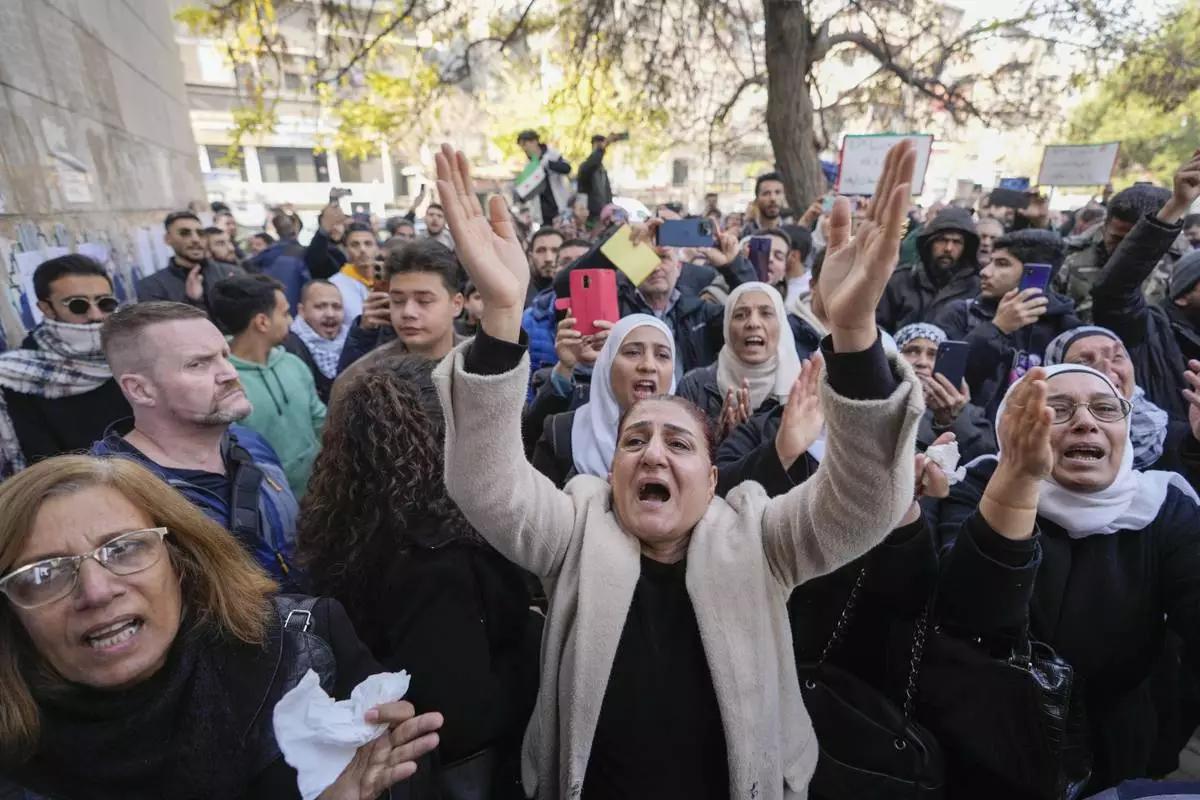
Mourners, including his sister Amal, left, attend the funeral of Syrian activist Mazen al-Hamada in Damascus Thursday Dec. 12, 2024. Al-Hamad's mangled corpse was found wrapped in a bloody sheet in Saydnaya prison. He had fled to Europe but returned to Syria in 2020 and was imprisoned upon arrival. (AP Photo/Hussein Malla)
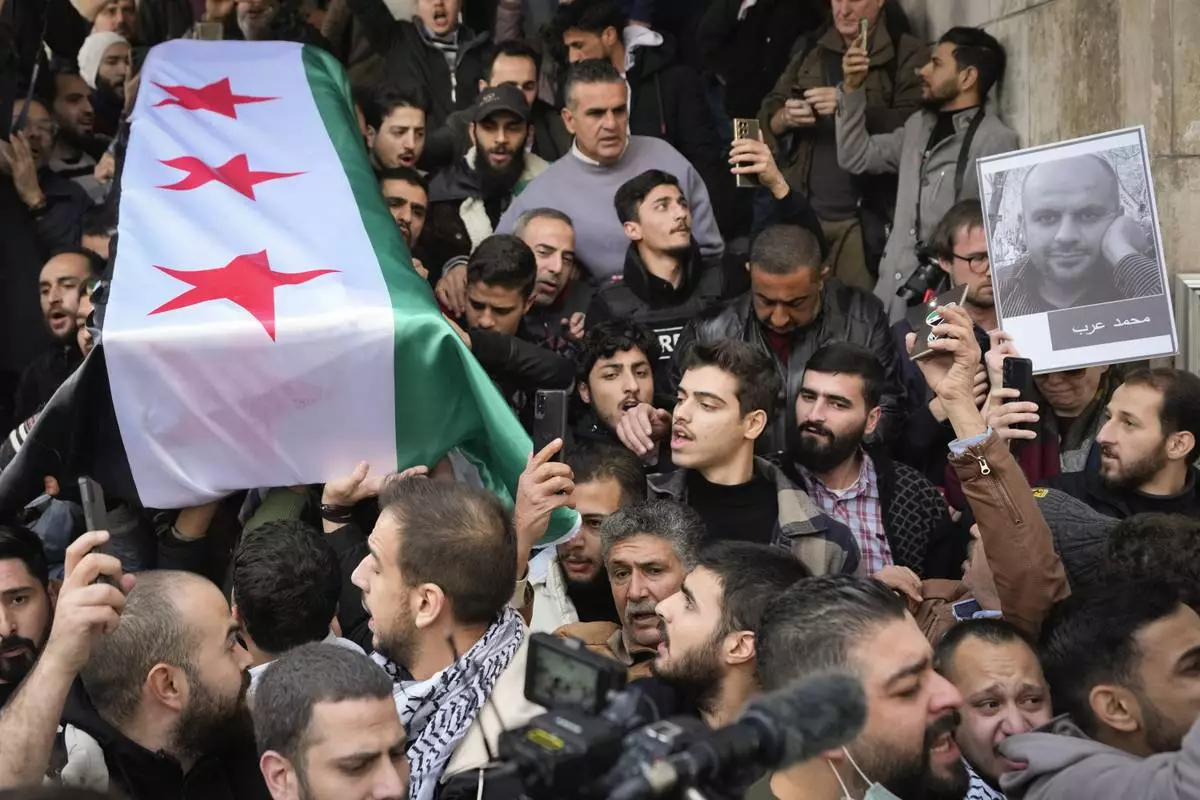
The coffin of Syrian activist Mazen al-Hamada is carried for burial in Damascus Thursday Dec. 12, 2024. Al-Hamad's mangled corpse was found wrapped in a bloody sheet in Saydnaya prison. He had fled to Europe but returned to Syria in 2020 and was imprisoned upon arrival. (AP Photo/Hussein Malla)
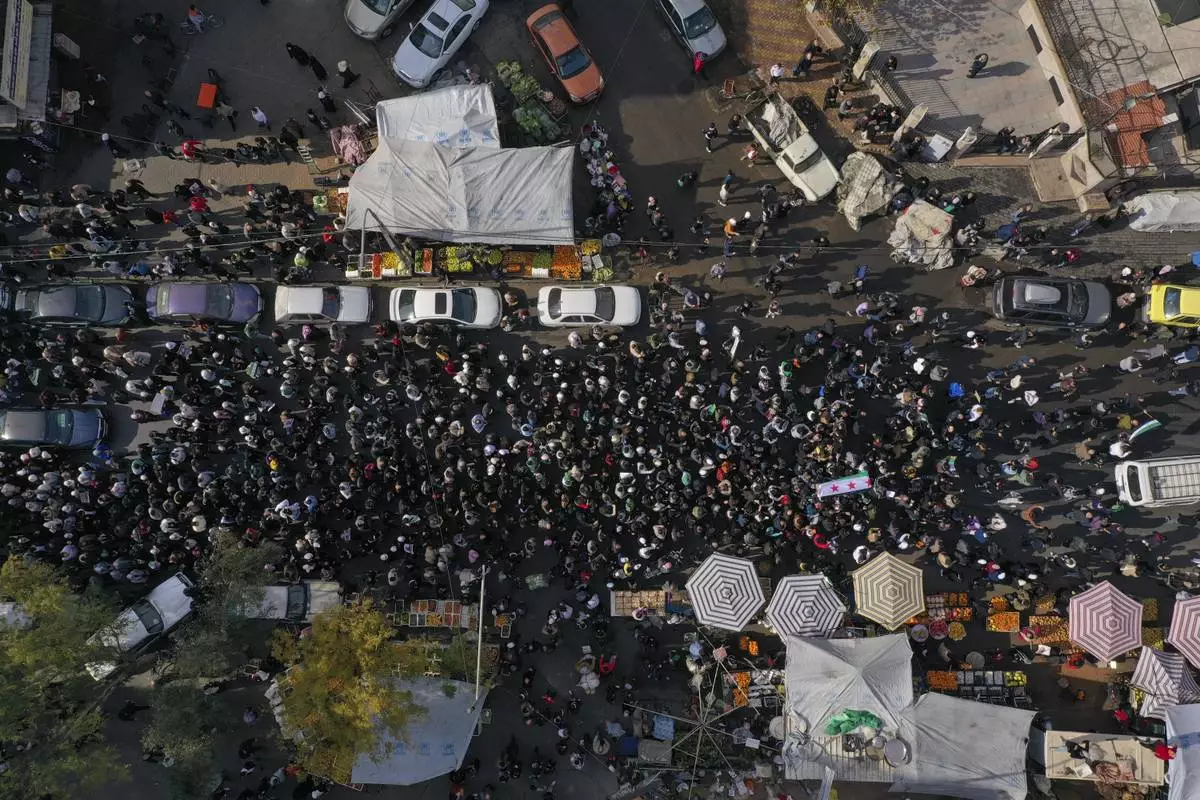
The coffin of Syrian activist Mazen al-Hamada is carried for burial in Damascus Thursday Dec. 12, 2024. Al-Hamad's mangled corpse was found wrapped in a bloody sheet in Saydnaya prison. He had fled to Europe but returned to Syria in 2020 and was imprisoned upon arrival. (AP Photo/Ghaith Alsayed)
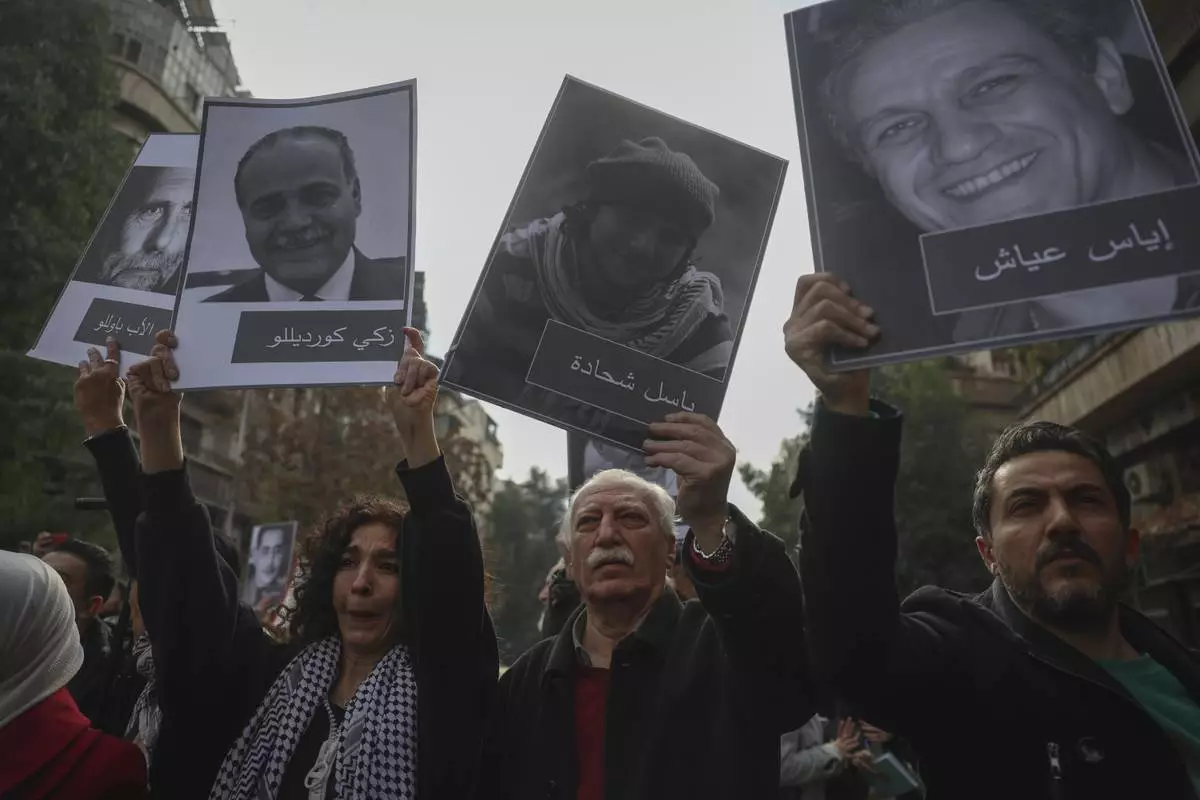
Mourners hold up portraits of missing opposition activists during the funeral of Syrian activist Mazen al-Hamada iin Damascus Thursday Dec. 12, 2024. Al-Hamad's mangled corpse was found wrapped in a bloody sheet in Saydnaya prison. He had fled to Europe but returned to Syria in 2020 and was imprisoned upon arrival. (AP Photo/Ghaith Alsayed)
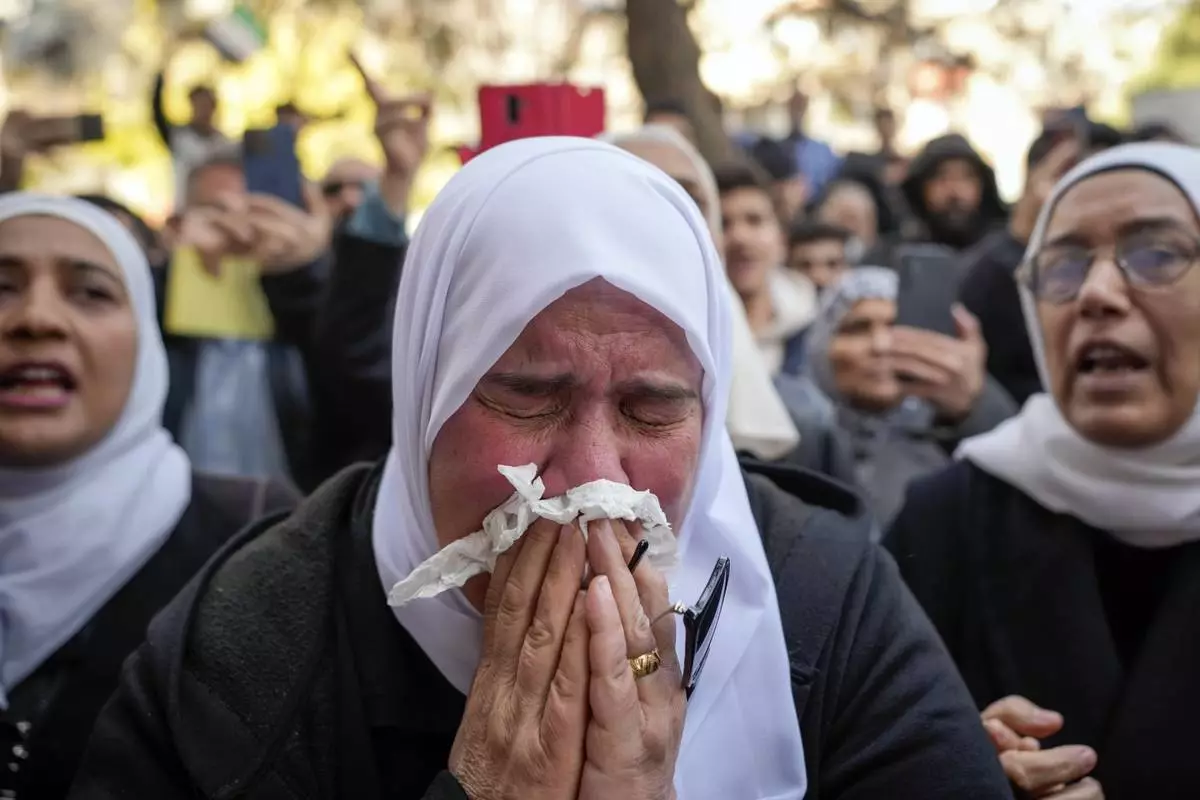
A woman weeps during the funeral of Syrian activist Mazen al-Hamada in Damascus, Thursday, Dec. 12, 2024. Al-Hamad's mangled corpse was found wrapped in a bloody sheet in Saydnaya prison. He had fled to Europe but returned to Syria in 2020 and was imprisoned upon arrival. (AP Photo/Hussein Malla)
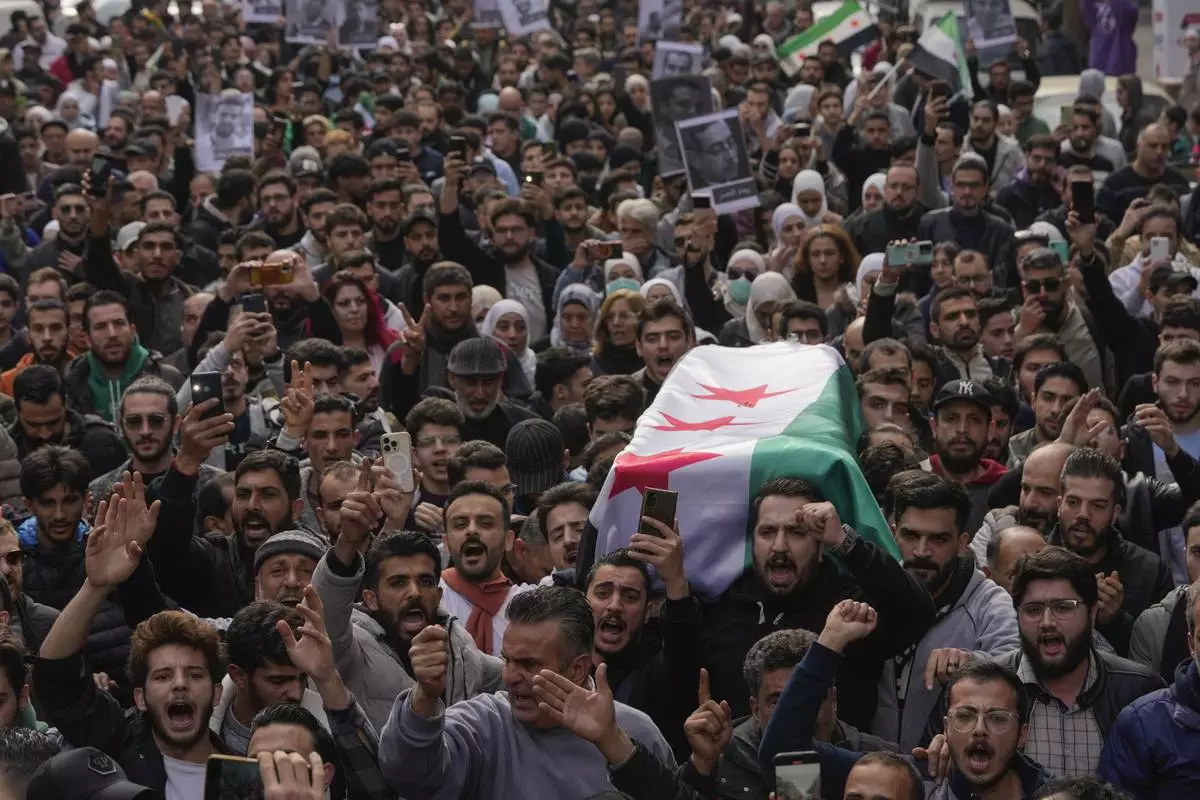
The coffin of Syrian activist Mazen al-Hamada is carried for burial in Damascus Thursday Dec. 12, 2024. Al-Hamad's mangled corpse was found wrapped in a bloody sheet in Saydnaya prison. He had fled to Europe but returned to Syria in 2020 and was imprisoned upon arrival. (AP Photo/Hussein Malla)
BRUSSELS (AP) — NATO Secretary General Mark Rutte warned on Thursday that Russian President Vladimir Putin wants to “wipe Ukraine off the map” and could come after other parts of Europe next, as he urged Europeans to press their governments to ramp up defense spending.
“It is time to shift to a wartime mindset,” Rutte told security experts and analysts at the Carnegie Europe think-tank in Brussels. He said people should gird themselves for the prospect that Russia might try to use “swarms of drones” in Europe as it has to deadly effect in Ukraine.
Putin “is trying to crush our freedom and way of life," Rutte said. The former Dutch prime minister listed Russia’s attacks on Georgia in 2008, the annexation of Ukraine’s Crimean Peninsula in 2014, and the all-out invasion launched almost three years ago.
“How many more wake-up calls do we need? We should be profoundly concerned. I know I am,” he said. “Russia is preparing for long-term confrontation. With Ukraine, and with us."
Rutte’s inaugural speech came just over two months after he took office as NATO’s top civilian official. He has since toured the capitals of the 32 allies, including a visit to NATO's most important member, the United States to meet with President-elect Donald Trump.
NATO has been a staunch backer of Ukraine and has helped most of its members funnel weapons, ammunition and other support into the country. But Trump’s return, and pledge to end the war quickly, has fueled concern that an unfavorable truce might be forced on Ukraine.
Asked by the Associated Press how damaging a quick and shoddy peace agreement might be, Rutte said that “a bad deal means Putin coming out on top, and that will have worldwide ramifications, not only on Europe and Ukraine.” He insisted that Ukraine must be involved in any peace talks.
Trump routinely complains that U.S. allies in NATO are not spending enough on defense. Rutte said Russia’s military spending is likely to amount to 7 to 8% of its GDP next year -– far more than any NATO ally –- while its defense industry churns out tanks, armored vehicles and ammunition.
Putin also has the support of allies like China, Iran and North Korea.
Rutte noted that defense spending has risen sharply in Europe, with 23 allies expected to reach NATO’s target of putting 2% of GDP into their military budgets. But he added: “I can tell you, we are going to need a lot more than 2%.”
Rutte listed a series of recent “hostile actions” by Russia against NATO allies, including cyber-attacks, assassinations, an explosion at a Czech ammunition depot, the jamming of radars in the Baltic region to disrupt air traffic, and the “weaponization” of migrants to destabilize Europe.
“These attacks are not just isolated incidents. They are the result of a coordinated campaign to destabilize our societies and discourage us from supporting Ukraine,” he said. “They circumvent our deterrence and bring the front line to our front doors.”
Beyond increased defense spending in Europe, Rutte noted that NATO now has tens of thousands of troops on high readiness should they be needed to defend allied territory.
“With all this, our deterrence is good -– for now. But it’s tomorrow I’m worried about,” he said, and warned that “we are not ready for what is coming our way in four to five years. Danger is moving towards us at full speed.”
“What is happening in Ukraine could happen here too, and regardless of the outcome of this war, we will not be safe in the future unless we are prepared to deal with danger,” Rutte added.
Rutte appealed to governments to provide the defense industry with “the big orders and long-term contracts they need to rapidly produce more and better capabilities.” He urged the industry to boost production for defenses against drones and other new war tactics.
He added that “freedom does not come for free” to the estimated 1 billion people living in the Euro-Atlantic area.
“If we don’t spend more together now to prevent war, we will pay a much, much, much higher price later to fight it. Not billions, but trillions of euros. That’s if we come out on top, and that’s if we win,” he said.

NATO Secretary General Mark Rutte speaks during a media conference at the conclusion of a meeting of NATO foreign ministers at NATO headquarters in Brussels, Wednesday, Dec. 4, 2024. (AP Photo/Virginia Mayo)

NATO Secretary General Mark Rutte speaks during a media conference at the conclusion of a meeting of NATO foreign ministers at NATO headquarters in Brussels, Wednesday, Dec. 4, 2024. (AP Photo/Virginia Mayo)











